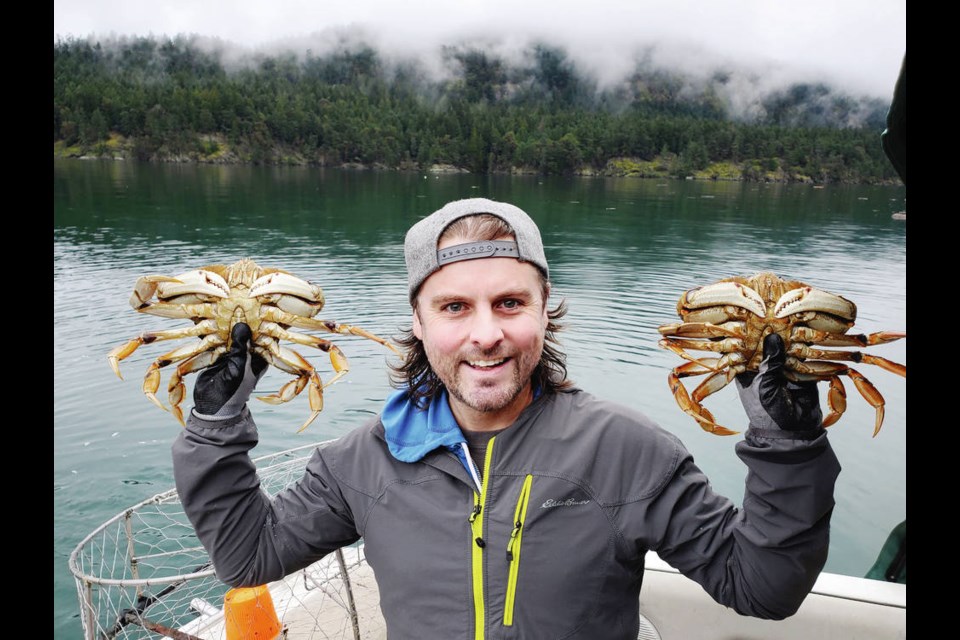Stef Lowey would love a slice a pizza, but a seaweed salad with grated bull kelp, beets and carrots will have to do.
Likewise for Chris Hall. A Starbucks would go down well right about now, but it’s a grande cup of fresh hazelnut milk instead.
The pandemic to most of us has meant sequestered days at home and weekly trips to the grocery store.
But for Lowey and Hall, stores are out of the question.
The Pender Island couple is on an epic one-year quest to only eat what they catch, grow, harvest and raise.
That means no processed or packaged food. No takeout. No alcohol, coffee, tea or soft drinks.
Nothing is ingested that isn’t hatched and hewn from their half-acre patch on Pender, harvested from the Salish Sea or grown and given by neighbours. To start the quest from scratch, they gave away all their store-bought food.
Five months into their year-long quest — and well into winter — Lowey and Hall say they’re happier, healthier and a lot wiser about the food most of us take for granted.
“It gets you out of your comfort zone,” says Hall, 38. “We started to think a lot about where our food comes from.”
Hall says working in stressful jobs that led to a lifestyle of unhealthy eating prompted the “complete 180.”
The couple both worked at Poet’s Cove Resort on Pender — Hall as general manager and Lowey, 24, in the hotel spa — but left their jobs after the pandemic hit in March and dried up their hours. They collected pandemic benefits from the government for a time, but have since both worked odd jobs to make ends meet.
They live in Hall’s family cabin, which his parents purchased in the 1980s, and have turned it into a self-contained little farm with chickens, turkeys and pigs, a large year-round garden and an ocean on their doorstep where they fish, trap prawns and crab and rake in the seaweed.
The chickens supply daily eggs and turkeys a supply of meat. Although most of their small drift of pigs is for breeding, they’ve produced some bacon and ham, cured by salt drawn from the sea.
Flour is ground from nuts and they use stevia leaves as a sugar substitute.
The garden produces fresh vegetables and the ocean has provided halibut and salmon in season, as well as sole, which Hall says they catch all year using a lure with a bit of their bacon on the hook (an old trick from his father, Jon).
Grapes, peaches, plums and apples are collected from neighbours for free.
Nothing is wasted. In fact, over the last three months, the couple has produced just two small bags of waste.
And the freezer is almost always full with fruit, vegetables, meat and seafood.
Lowey says she’s lost 30 pounds as a result of the new regime, while Hall lost about 40 — weight they both feel they could afford to lose. They also feel they have more energy.
Both had a conference call with their doctor on Friday and they’re expecting clean bills of health after they have blood work done next week.
Lowey says some people worried at first that they were losing too much weight.
“The first three weeks were tough on the system,” Hall says, “but everything eventually balanced out.
“Once you stop the coffee, the gluten, alcohol and all the processed food, you drop the weight and get to a healthy balance.”
Creating the farm, raising birds and pigs and getting out in their boat have added to their physical and spiritual well-being, the couple say.
The survival hacks, research and new skills acquired on their path to self sufficiency have also brought them renewed confidence.
Killing and gutting their first turkey, for example, wasn’t easy for Hall, a Vancouver native, or Lowey, who hails from Abbotsford, but necessary if they wanted to eat.
“We’ve never raised one, let alone killed one … a turkey was something you see in stores,” says Hall.
Though family and friends initially thought they weren’t serious about their quest, they’re now quite supportive, says Lowey.
“My dad is a hunter and fisher, so he is just jazzed about it. My mom is super-supportive, but concerned at first when she saw a lot of weight drop off.”
The couple are filming their journey to food self-sufficiency and posting regular installments — both successes and failures — on their .
Posts include comical scenes of chasing ducks and hauling pigs, informative shots of harvesting and preparing food, as well as warm moments of filming orcas and otters and their own personal exchanges.
“It’s pulled us closer together and we’ve learned a lot about each other,” says Lowey. “I love this lifestyle and the relationship with nature. I know I will continue to do a lot of the things we’ve learned, even after we’ve finished this year challenge.”
The pandemic has added extra relevance to what they are doing. Although supply chains are so far strong, Hall says self-reliance is more important than ever.
“We take for granted that we can walk into a grocery store and buy whatever we want … we’ve lost that primal survival instinct.
“We’re so reliant on these corporate structures and luxuries we have in place, so it’s an interesting challenge to go back and love off the land.”
The end of the challenge comes Aug. 3.
In the meantime, the couple is planting a tree for each person who subscribes to their free YouTube channel. So far, it’s more than 1,500.



